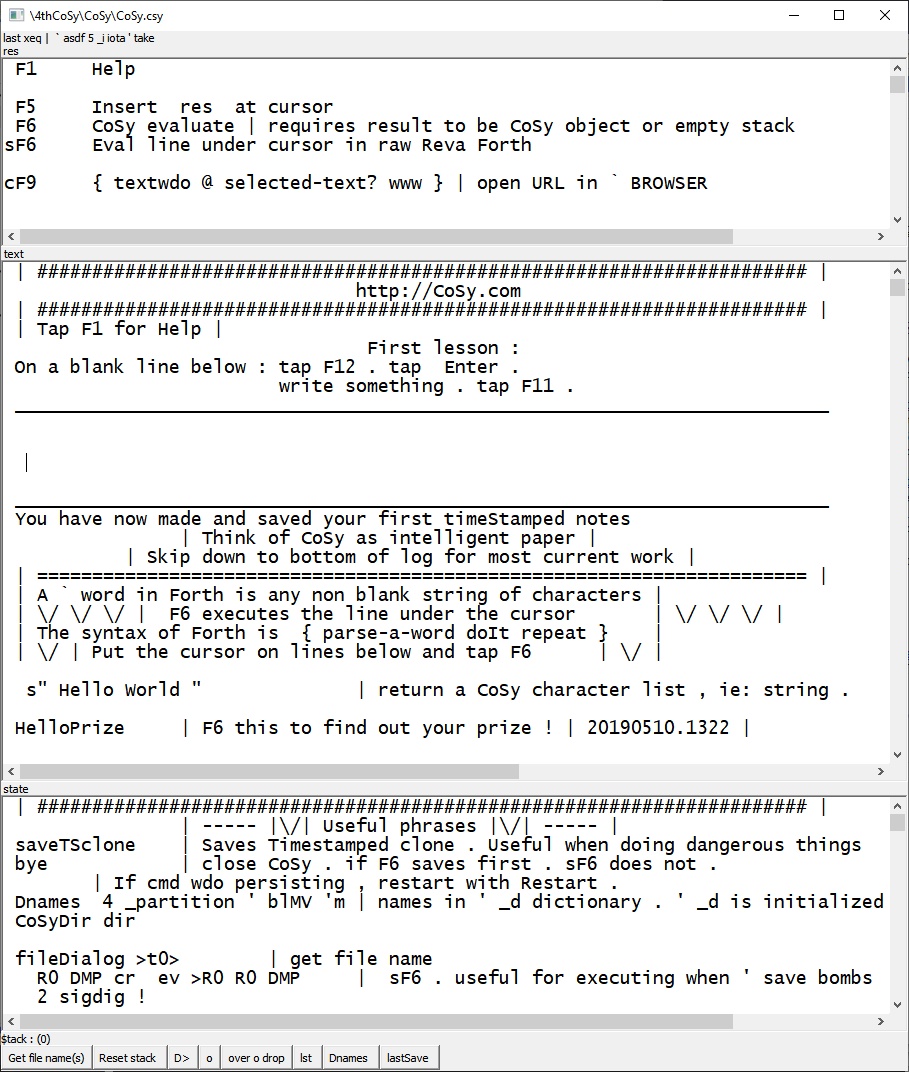|
From a FaceBook Messenger
exchange
The
only thing I said, I did never found the starting point, how to help
you with your project. I did not find, where REVA or Forth ends, and
Where COSY Begins, |
20200320 | |
| Oh
, man , you are touching on a clear weakness . But one I think common
in maths . When the gestalt has so many aspects which you have to
describe in some sequence before the totality can be ` groked . Like
what a determinant is . On my YouTubes I have tried the describing-the-elephant by examining a tail or a leg approach going thru a single line of code . Thru the course of discussion I've concluded the most direct way to begin migration and the most powerful single thing is to get the http://cosy.com/4thCoSy/Code/lib/net/sockets vocabulary integrated with CoSy and a tcp/ip link between an instance of CoSy and an instance of Foth2020 . I think it's essentially trivial for somebody whose ever done that stuff . I think one reason Arthur never had any interest in enhancing the GUI in original K was that he saw TCP/IP as the universal interface between processes . But these comments may just reflect how little I understand the world outside of CoSy . CoSy's unique power comes from the fact that it's a ` FirstPerson system , made by me for my own ambient use . But that's also a major barrier to entry . In any case , connecting the 2 as peers supplies immediate synergies and makes possible the exploration of each side . In terms of where Reva ends and CoSy begins , verbs ' venn : venn 2p (' R@ L@ ~membv LR@ membv
LR@ ~membv ') 2P> ;
| returns list of 3 lists : ( x nin y ; x in y ; y nin x ) can very quickly determine the intersection of vocabularies . You've given me a lot to work on . But , again , the continued doing and enhancement of my accounting abilities and responsibilities is my unavoidable priority . |
|
Again
, If you are writing in some system that has already solved memory
management in anything other than Forth , it is a Toy which has NOT
extended the domain of Forth to the level of those languages . It is trivial to create a Forth
if you have memory managed objects , but it's going the wrong way . See
https://youtu.be/0fVK_A209Fc
for the essence of Forth in a few lines of CoSy .
|
You did not understand,  they keep running win32forth.exe absolutely normal implementation, but
they did the SOCKET communication to A JAVASCRIPT program that works as
server.
they keep running win32forth.exe absolutely normal implementation, but
they did the SOCKET communication to A JAVASCRIPT program that works as
server. |
| Oh
! I thought you were saying they were one of the many who
implement Forth in some sense in memory managed language like I've
recently seen talked about for Perl . The fundamental serving has to be
done by the Forth . JavaScript may be a useful intermediary to the Web
. Again , as I understand it , the fundamental and universal interface
is thru TCP/IP which is useful even as ` localhost . I believe that Kx
even uses TCP/IP for communication between K processes on on the same
processor and across processors . Again , there's little point in my doing anything as a solo act . [ The same is true in terms of modeling planetary temperature physics in CoSy ] I did play with K's small sockets vocabulary to set up inter-process server-client communication a good number of years ago , so I know it's not terribly complected . But , again , there's no point in my just learning another way to talk to myself . |
What does
APL add to open native Forth ?
Speaking to a Forther who understands the unique simplicity , openness and and understanding of the nature of ` compiling and direct interaction with hardware of Charles Moore's language , I'll address what Ken Iverson's , as retold by Arthur Whitney , APL adds .
( If not familiar with APL I strongly suggest reading or watching some of the many references to APL . See the 1998 K Reference Manual for the direct legacy from which 4th.CoSy evolves . )
In a word , I'd
say plurals .
And that implies objects . The most basic object on all computers is an address space . Forth provides a minimal vocabulary laying out in a single address space a dictionary capable of appending new words to itself . An address space is an integer indexed list of constant sized cells themselves lists of bits .
Nouns
Lists are CoSy's nouns . So the most fundamental
vocabulary CoSy
adds to a Forth vocabulary is lexicon to allocate and free address
spaces with a simple 3 cell header containing the fundamental
information about themselves :`( type count refCount )`
CoSy
verbs generally expect addresses of CoSy
lists as arguments . Ones which expect a naked cell are
generally prefixed by a ` _
.A cell gives an awful lot of space for types and currently only `( char int float )` are defined in addition to a general list , a list of addresses of lists , which is type 0 .
When a list is created , its reference count is set to 0 . No other object , no other list refers to it . But , for instance , if it's just an item in a higher level list , it reference count will be incremented appropriately . In general on exit most Forth level verbs free any argument which has a ref count of 0 . The vocabulary , I'm inclined to call it algebra , for the accounting of references is the enabler for everything else . But a crucial piece of this vocabulary is the ability to convert these recursive lists of address spaces to and from a linear form for transfer and storage .
Verbs & Adverbs
Iverson came to prefer the ordinary words verbs and adverbs to APL's original functions and operators . A verb is simply a word which takes nouns as arguments . Adverbs take verbs along with nouns among their arguments . See the top of the distribution ` text log for executable examples .
Two of Moore's brilliances make these constructions much simpler and flexible than other APLs .
- Forth's Read-It Do It RPN syntax with words simply being any non-blank string of characters
- Because of Forth's unique transparency the address of any
word , including verbs can be placed on the stack trivially using the
word ' , simply a quote .
It puts the address of the next word in the string being evaluated on
the stack . A verb can be defined inline by enclosing in { and } with the same effect .
5 _i iota
|>| 0 1 2 3 4 | takes a naked 5 off the stack convert it
to a 1 item
| then ' iota ( an ancient APL name ) returns a list of first 5 integers , ie: an
| index into an address space .
Most of the adverbs in CoSy
, as in previous APLs , apply a verb to each item in a list or each
corresponding pair of items in a pair lists . | then ' iota ( an ancient APL name ) returns a list of first 5 integers , ie: an
| index into an address space .
It
can do this because the count of items in a list , for which I'm stuck
on the venerable APL name rho , is the second cell in the header . And
, an inovation which eliminates a lot of complexity in APL and
possibility of bounds errors , is
all indexing is modulo .
Thus almost all loops become words taking a list or lists , a verb , and an adverb . Following Arthur Whitney , there are 4 basic flavors :
list ' verb 'm
| 'm for monadic , ie: single argument
Llist Rlist ' verb 'd | 'd for dyadic , ie: 2 argument . apply verb to each pair
Llist Rlist ' verb 'L | 'L for apply the Rlist as a whole to each item in Llist
Llist Rlist ' verb 'R | 'R for apply the Llist as a whole to each item in Rlist
For example :Llist Rlist ' verb 'd | 'd for dyadic , ie: 2 argument . apply verb to each pair
Llist Rlist ' verb 'L | 'L for apply the Rlist as a whole to each item in Llist
Llist Rlist ' verb 'R | 'R for apply the Llist as a whole to each item in Rlist
` asdf 5 _i iota ' take 'R
(
a
as
asd
asdf
)
(
a
as
asd
asdf
)
This is why I consider APL kind of like a Fourier transform of scalar programming language space .
Join CoSy αlphas .
Charter 1 year Membership just $25
Join the development discussion , start your own project ,
simply use CoSy
to assist you in your everyday business of life
Inclusion and Access to Member simple open email list ,ccnotbcc.
and Members archive directory
--
 |
|
||||

